Known as Ajitsuke Tamago or Ajitama in Japanese, Ramen Eggs are delicious as a topping on ramen or enjoyed as a snack. Learn to make these flavorful, perfect soft-boiled eggs with just five ingredients!
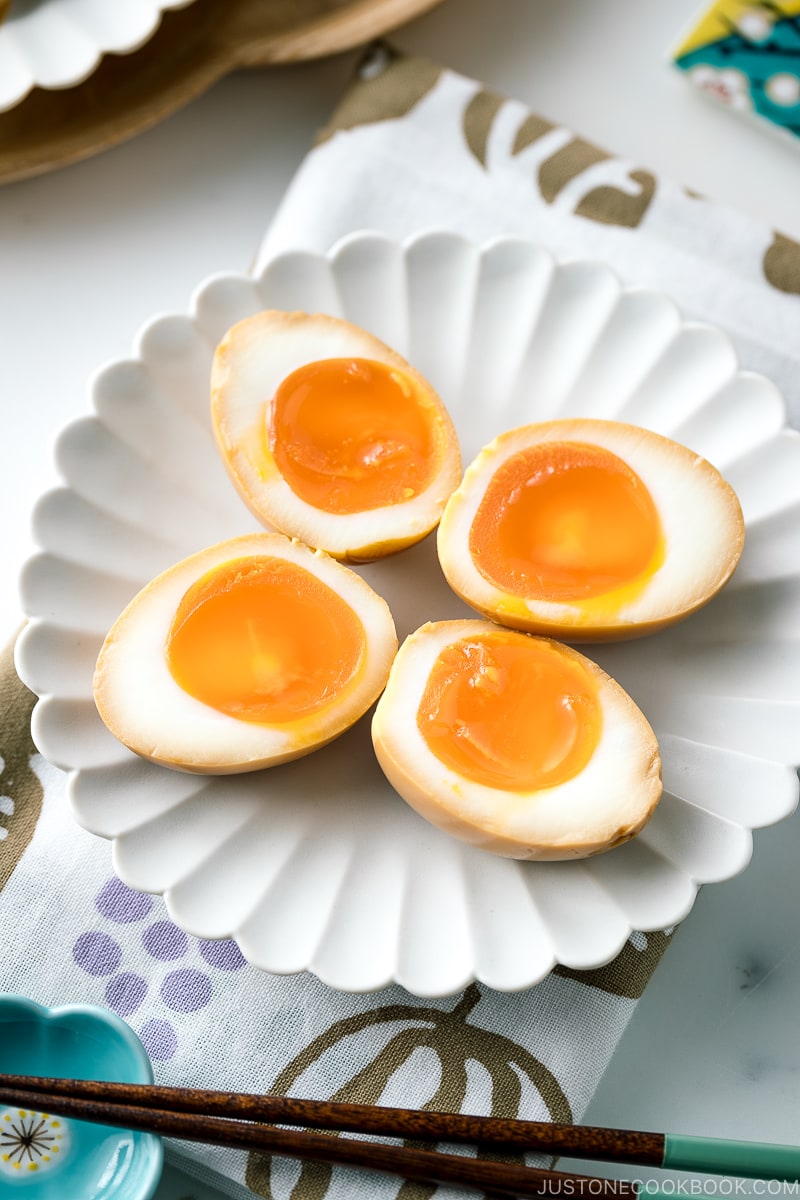
A great bowl of ramen is built upon a few significant components. There’s hot broth, fresh-made noodles, and the toppings. As far as the toppings go, no one can resist a perfectly cooked ramen egg that sits alongside sliced chashu, a sheet of nori, and green onions. Some would even argue that ramen egg is a must!
When done right, ramen egg is creamy, silky, full of umami, and ready to enrich and intensify your ramen enjoyment. The truth is, ramen eggs are not just for ramen alone. You can enjoy these delicious eggs anytime, in many different ways!
Table of Contents
What Are Ramen Eggs?
Ramen eggs are Japanese soft-boiled eggs known for their custardy, jammy, runny yolk, and umami flavor. They are marinated overnight in a sweetened soy-based sauce. In Japan, we call these marinated eggs Ajitsuke Tamago (味付け玉子), short for Ajitama (味玉) or Nitamago (煮玉子).
While these eggs are excellent on ramen, they are also fantastic to enjoy as a side dish, snack, or packed in a bento. Don’t limit yourself there! You can even add them to salads or sandwiches. That’s the magic of ramen eggs. They are so good and amazingly versatile.
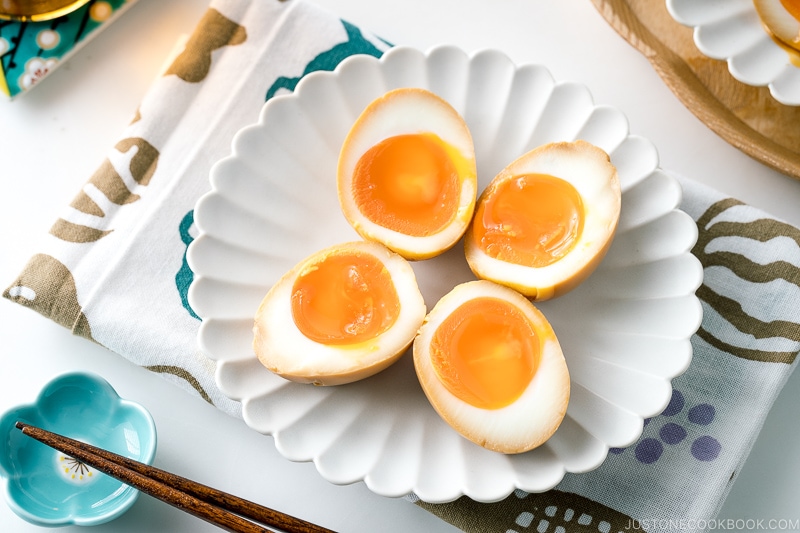
Ingredients for Ajituske Tamago
Five ingredients are all you need, and you’ll be surprised at how easy it is to make ramen eggs at home.
- Good quality eggs, especially if you plan to make soft-boiled eggs
- Soy sauce
- Mirin
- Sake (or water)
- Sugar
For the marinade, you can create your version with additions (such as chili flakes for spice, etc), but let’s stick with the basics.
What changed from the 2011 Recipe?
Some of you might be familiar with the original recipe I shared in 2011. In the past, I used water instead of sake. However, for food safety reasons, I started making my ramen eggs with sake and like this version much better.
Why sake? The amino acids in the fermented rice wine enhance food flavors by adding hints of sweetness and umami, which makes the eggs taste better. In case you’re wondering, we would boil off the alcohol from the sake before marinating the eggs so it’s perfectly safe for kids to consume.
As part of the refinement, I also added a bit of sugar. To put the old and new recipes to the test, I had my family try out the two versions multiple times, and they concluded that the winner goes to this updated recipe. For those who can’t consume alcohol, you can still use water.
How to Make Best Ramen Eggs
You can find the detailed recipe below, but here’s a quick overview.
Jump to Recipe- Make the marinade.
- Cook soft-boiled eggs.
- Marinate the eggs overnight.
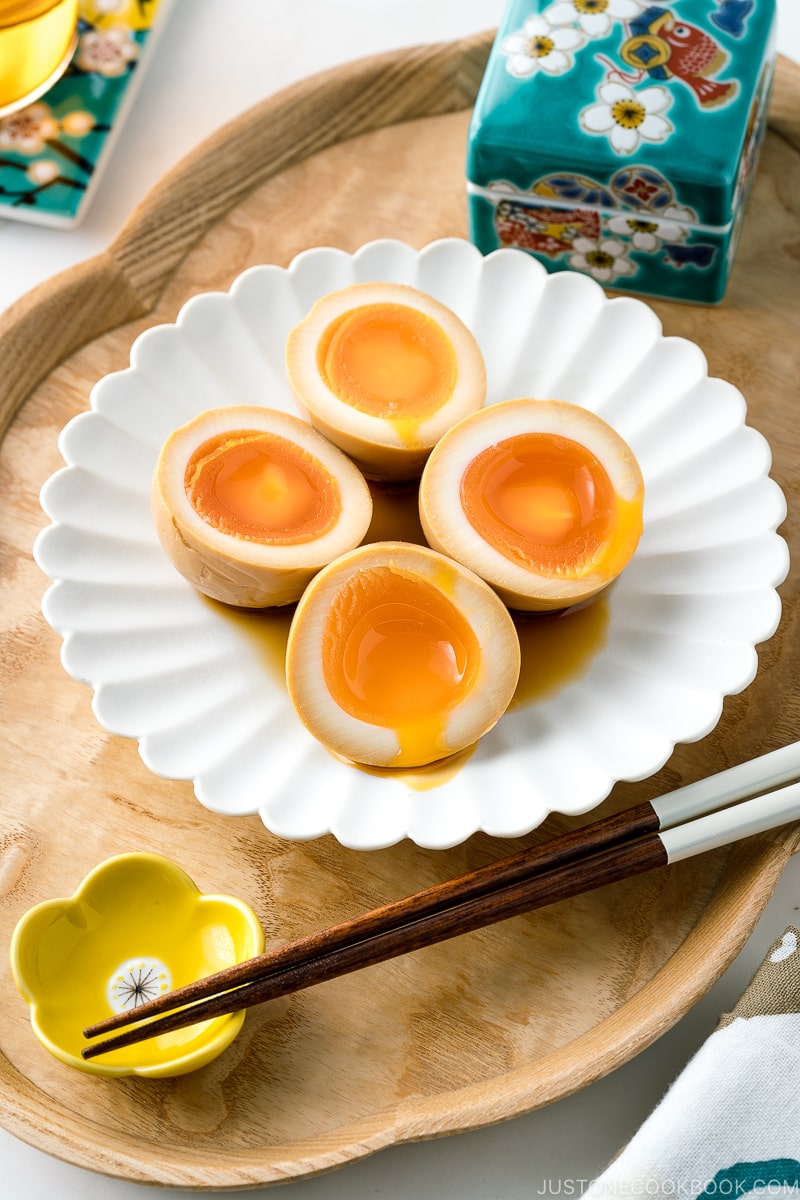
Cooking Tips
Tip #1: Cook the marinade
To make the marinade, I highly recommend cooking it for 1 minute after boiling. This ensures the sugar dissolves and the alcohol evaporates, leaving only the natural umami and sweetness in the sauce.
Tip #2: Use refrigerated eggs
Using a fine-mesh sieve/strainer, gently lower your eggs straight from the fridge into the (already) boiling water and lower the heat slightly to a simmer.
Tip #3: Cook 7 minutes from the first egg in boiling water
Start setting the timer for 7 minutes from the first egg submerged in boiling water. It takes about 30 seconds or less to submerge all four eggs (set the timer for 6 minutes and 30 seconds if you start the timer when you finish submerging all the eggs. Little adjustment matters!)
I use large American eggs for this recipe, and knowing that egg sizes vary in different parts of the world, you might need to adjust the cooking time slightly.
Tip #4: Shock the eggs in ice water
Shock the boiled eggs in ice water immediately and let them chill for at least 15 minutes. I use the same ice water to dip the boiled eggs a few times when peeling them. Water goes into the gap and helps peel easily.
Tip #5: Marinate the eggs overnight
Marinate the ramen eggs for just a few hours or overnight. I can make ramen the next day while the eggs stay marinated in the fridge, waiting for their appearance.
How to Store Ramen Eggs
Soft-boiled eggs should be consumed in 3-4 days. Keep the Ajitsuke Tamago or ramen eggs in the refrigerator at all times. Use a clean utensil to take out a marinated egg, if you continue to marinate the rest of the eggs. I’d take out the ramen eggs after soaking them overnight as I don’t want my eggs to be too salty. You can marinate for up to 2 days at most, but I recommend removing from the marinade after that.
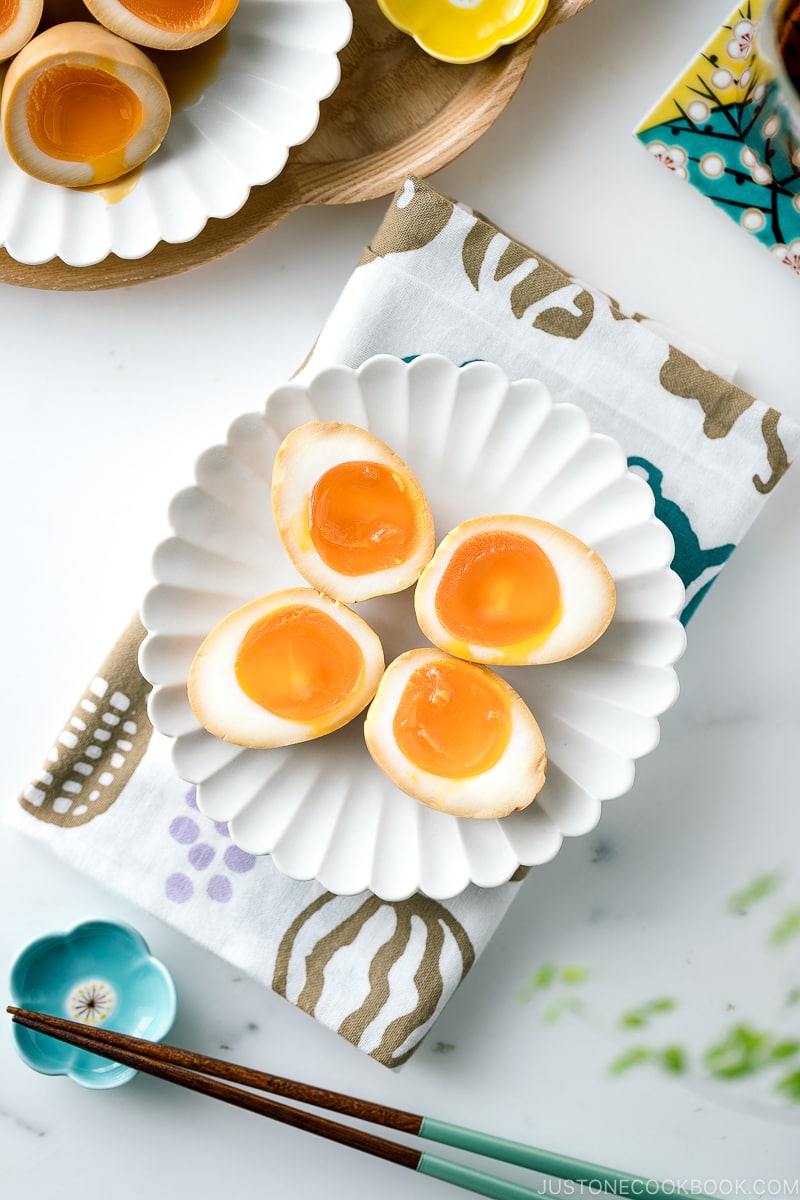
How to Serve
I hope you’ll try this recipe because it can make your day better. Here are my absolute favorite ways to enjoy the eggs.
- Serve with Miso Ramen
- Serve with Vegetarian Ramen
- Serve with Tsukemen (Dipipng Ramen Noodles)
- Serve on Avocado Toast
- Serve with Japanese Curry
- Pack in Bento Box
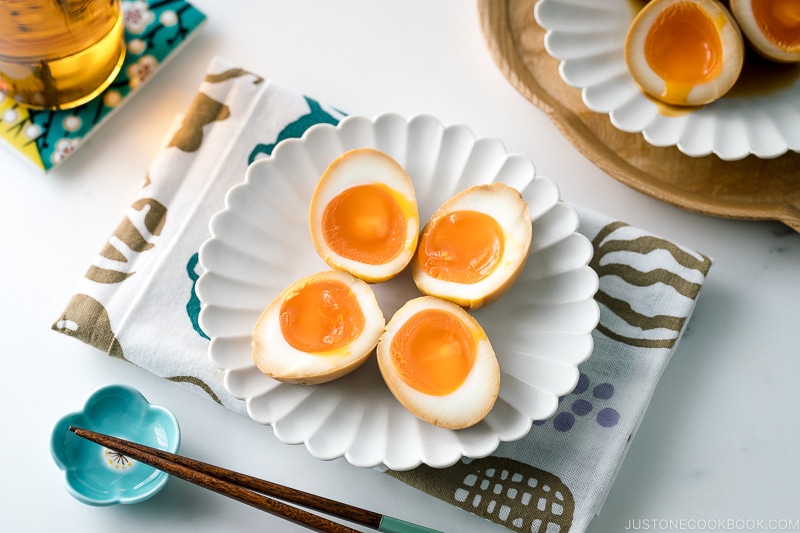
Wish to learn more about Japanese cooking? Sign up for our free newsletter to receive cooking tips & recipe updates! And stay in touch with me on Facebook, Pinterest, YouTube, and Instagram.

Ramen Eggs (Ajitsuke Tamago)
Video
Ingredients
- 4 large eggs (50 g each w/o shell) (refrigerated; use slightly older eggs, which are easier to peel)
Instructions
- Before You Start: Please note that this recipe requires a marination time of 8 hours or overnight. Gather all the ingredients.

To Make the Marinade
- In a small saucepan, combine all the ingredients for the marinade: ¼ cup soy sauce, ¼ cup mirin, ¼ cup sake, and 1 tsp sugar.

- Bring it to a boil and whisk it a few times to let the sugar dissolve completely. Once boiling, lower the heat and simmer for 1 minute. Turn off the heat. Set aside to cool completely.

To Make the Soft-Boiled Eggs
- Add 4 cups (1L) water (for 4 eggs) to a medium saucepan and bring it to a boil. There should be enough water to cover the eggs by at least 1 inch (2.5 cm). Once at a full boil, take out 4 large eggs (50 g each w/o shell) from the refrigerator. Carefully and gently lower one egg at a time into the boiling water with a mesh strainer/skimmer or a ladle. When you add the first egg, set a 7-minute timer. You can cook them 6 to 6½ minutes for a runny egg yolk and 8 to 9 minutes for a custard-like egg yolk.

- Once all the eggs are in the saucepan, lower the heat to maintain a gentle boil. Make sure the water is simmering, but not bubbling so strong that the eggs bounce around. If you want your egg yolks to be centered, gently rotate the eggs with chopsticks once in a while for the first 3 minutes.

- After 7 minutes, immediately take out the eggs and shock them in iced water for 15 minutes.

- Once the eggs are completely cool, gently crack the shell at the wide bottom end of the egg and start peeling it vertically toward the pointy top. Dip the egg in the iced water a few times to help with the peeling. Once you peel one section vertically, the rest of the shell comes off easily.

To Marinate the Eggs
- Place the eggs in a plastic bag and add the marinade to the bag. Why am I recommending a plastic bag? With a plastic bag, we don‘t have to use a lot of marinade to submerge the eggs. This marinade is used only one time for food safety reasons, so it’s most economical to prepare no more than the amount you need. If you use a container instead of a bag, it requires more marinade to submerge the eggs.

- Remove the air from the bag and use a clip or rubber band to seal the bag right above the eggs. This way, the eggs are completely submerged in the marinade. Refrigerate for 8 hours or overnight. You can rotate the eggs occasionally if you like.

To Serve
- Remove the eggs from the marinade and cut them in half lengthwise to serve. Use a piece of string, fishing line, or cheese cutter (that‘s what I used here) to cut the eggs in half cleanly. Enjoy the Ramen Eggs in bento, as a ramen topping, or as a snack sliced in half and sprinkled with furikake (rice seasonings) and shichimi togarashi (Japanese seven spice). If you want to warm up the eggs, soak the bag in warm water to bring up the temperature faster.

To Store
- Keep the Ramen Eggs refrigerated at all times. Do not freeze as the texture of eggs changes when frozen (with the exception of tamagoyaki). The ramen eggs will get saltier the longer they marinate, so take them out from the marinade after 12–24 hours (depending on your preference). Enjoy the ramen eggs within 3–4 days if your eggs are soft-boiled. If your eggs are hard-boiled, you can keep them in the refrigerator for up to a week. For food safety reasons, I do not recommend reusing this marinade with new boiled eggs. You can repurpose this marinade as a seasoning sauce for your stir-fried or simmered dishes but use it soon.
Notes
Nutrition
Editor’s Note: This post was originally published on September 14, 2014. It has been updated with new images, video, and blog content in September 2021.
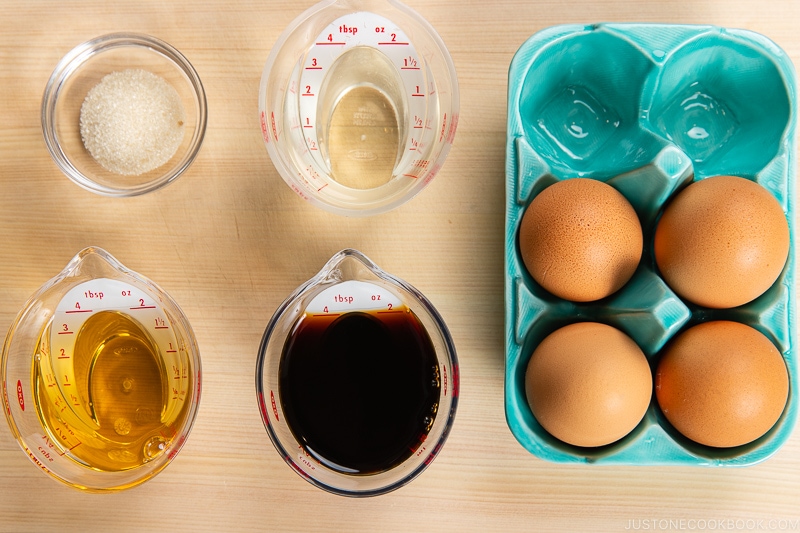
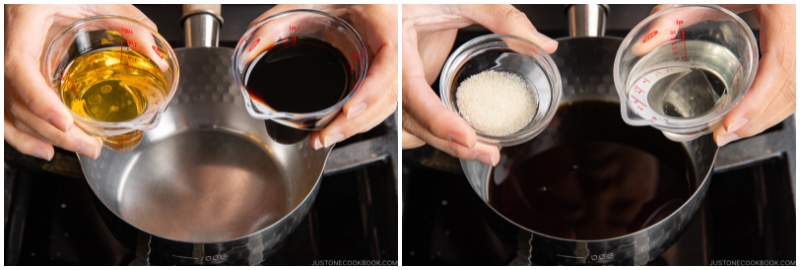
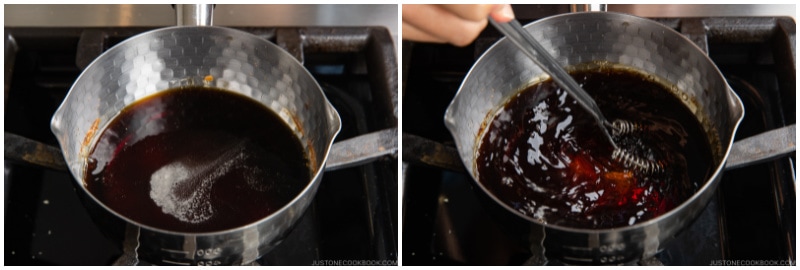
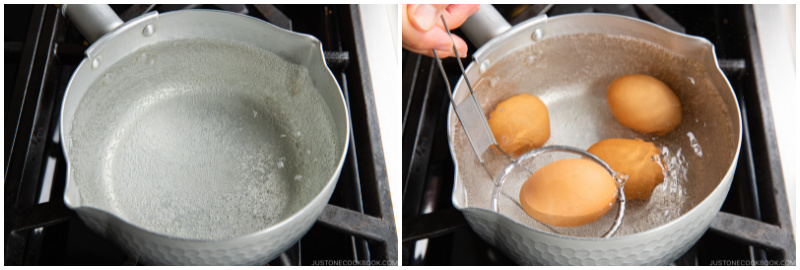
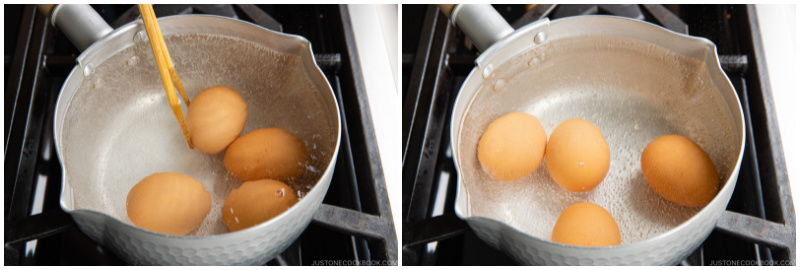
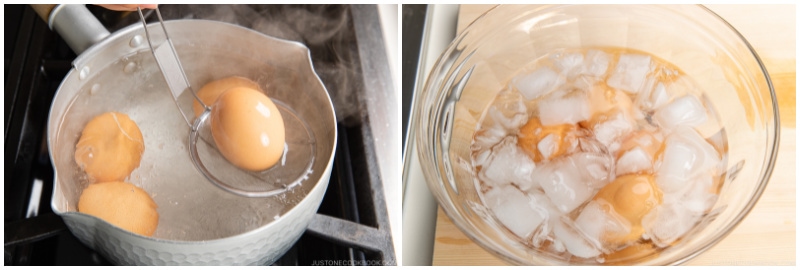
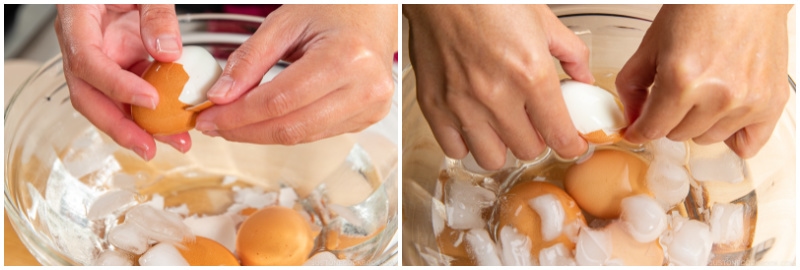
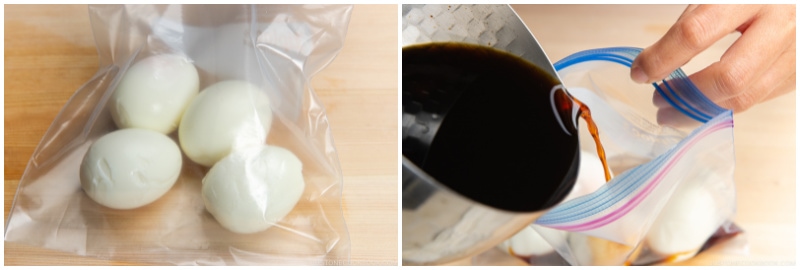
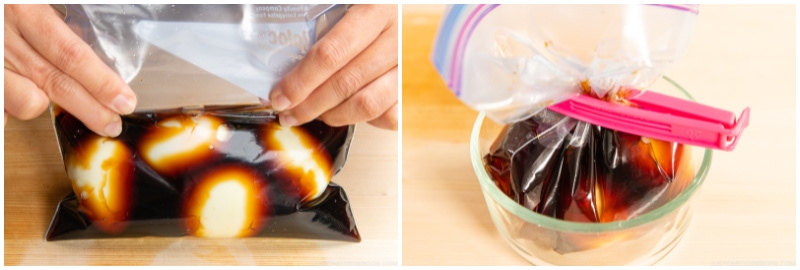
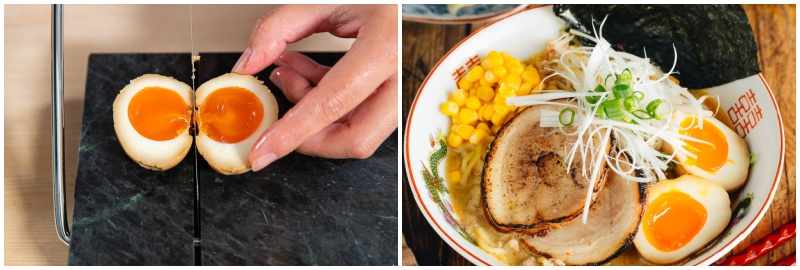

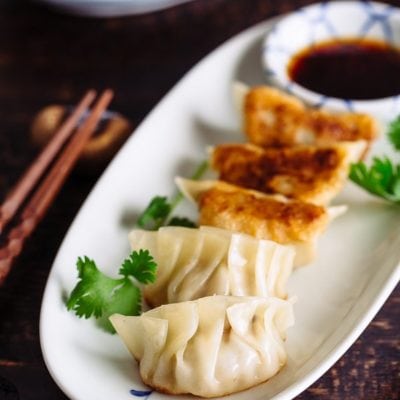



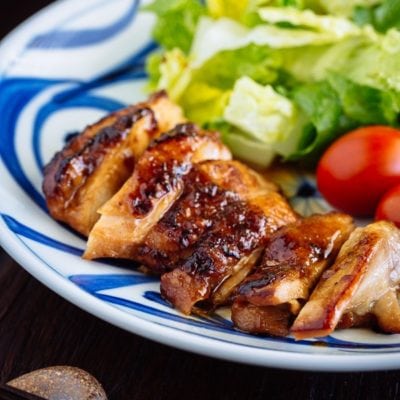
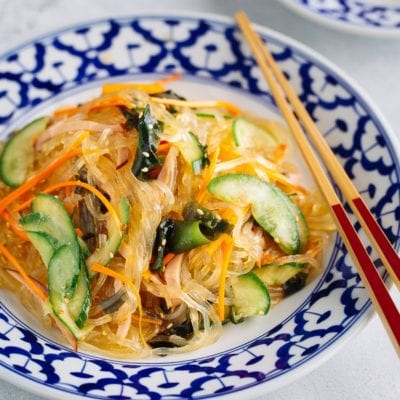
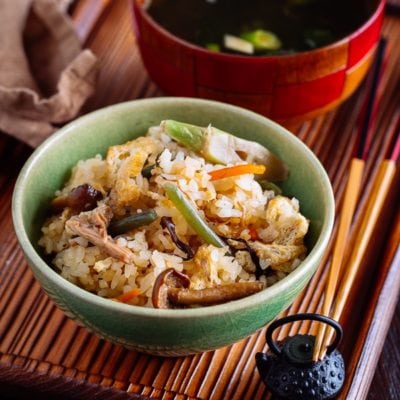
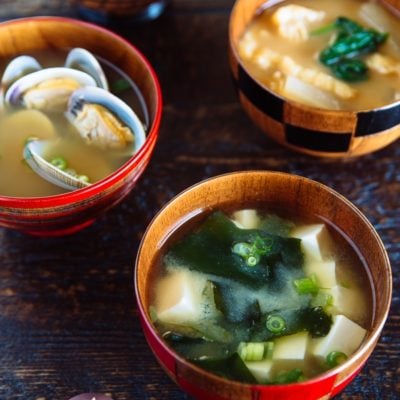



Hello , Nami san! Im really exited to try these eggs! Im nervous about making ramen for my friend group for the fist time , but i think might actually be an incredible topping for it, especially since my little sister loves eggs. Thanks a million!
Hi Sofie! Thank you very much for reading Nami’s post and for your kind feedback!
We hope you and your family and friends enjoy your Ramen. Good luck!
Thanks Nami san for updating the recipe. Adding vinegar and salt when boiling the eggs really helps me to peel off the eggs..very easy.
Hi Lee! Thank you very much for trying Nami’s recipe and for your kind feedback!
Nami and JOC team are so happy to hear the vinegar and salt technic worked well for you!
Hi,
I tried your 2011 recipe before but couldn’t find it anymore.
Was it 2 TBSP soya sauce, 2 TBSP mirin and 2 to 4 TBSP water? Kindly advise.
I would like to try both recipes to do a comparison.
Thank you
Hi Kelvin! Thank you very much for trying Nami’s recipe!
Here is the youtube video of the old version of this recipe, and the ingredient list is in the comment below in the youtube video.
https://www.youtube.com/watch?v=VLbp19Tg4OA
We hope this helps!
https://web.archive.org/web/20200929084548/https://www.justonecookbook.com/ramen-egg/
Hi! If we don’t want to use plastic, what are the marinade volumes for 4 eggs marinated in a jar? Can we just top it up with water? Jar size around 8oz/250ml. Thank you
Hi Sally, Thank you very much for trying Nami’s recipe!
For marinating four eggs, you will need a larger jar than 8oz.
The marinade amount in this recipe is 6 oz. So it depends on your eggs and jar size; you would need at least double the marinade amount.
We hope this helps!
Can you tell me where to get the ceramic egg holder (blue with room for six eggs) pictured in this recipe? I could not find it at he Musubi Kiln store.
Hi Brian! I think I got them at Anthropologie years ago and they don’t carry them anymore. You can find similar ones here:
https://amzn.to/3zG8QI8
The best way to cook eggs in their shells is to put a steamer basket in a pot and add water to the pot. The water should not be in the steamer basket. Put the eggs in the basket. They should not touch. Bring the water to a boil. Cook the eggs for 12 minutes (for hard boiled eggs), timing the eggs as soon as the water boils. After 12 minutes, remove the eggs and soak in a bowl with enough ice/water to cover all the eggs. Soak the eggs in the ice/water for 5 minutes. You can remove the shells easily. For softer eggs, steam the eggs for a shorter time.
Hi Irene! Thank you for sharing your cooking experience and tip with us!
Namiko has given us her best research & experience in cooking soft ramen eggs. That’s what we are here for. If we want hard boiled eggs, we won’t need to be on this webpage.
Thank you for all the beautiful depth recipes.
Hi Martha! We are glad to hear you enjoyed Nami’s recipe!
Thank you for your kind feedback!😊
thank you for the recipe, nami. made this last night for today’s lunch. i pair it with your yaki udon recipe, since i don’t have any ramen at home. and also my daughter loves egg! =)
Hi Sylvia! Thank you very much for trying Nami’s recipe and for your kind feedback!
Nami and JOC team are so happy to hear your family enjoyed Ramen Egg!😊
Hi Nami, love the recipe! Thank you. if the eggs are bigger than 50g, (around 70g), how much longer should we boil them?
Hi Mei! Thank you very much for reading Nami’s post!
We didn’t test with other size eggs, and we are not sure of the exact cook time. Try adding one more minute?
My eggs went bad after soaking for a few days . What have I done wrong ?
Hi Renee, We are sorry to hear your eggs went bad.😞
As Nami mentioned in the recipe, If you plan to soak for a few days, please adjust the saltiness and use less water. And make sure to store it in the refrigerator all the time. We hope this helps!
Nami san, do you have any advise to peel the egg? I have such a terrible time peeling them… looks very ugly because it is still very soft. Lots of white part got taken out when i peel it. Kindly advise.
Hi Lee, Thank you very much for reading Nami’s blog.
To peel the eggshell, you can shock the eggs in cold water, gently shakes them so that the eggs will crack. Once the eggshell is crack, peel them underwater. Another trick is to make a small hole on the eggshell with a pin (sewing pin, etc.) before you start cooking eggs.
We hope this helps!
Thanks Nami san. I add 1 minute time (total 10 mins instead of 9 mins) and it works well now. I can peel the eggs off (and still looking quite pretty, at least not breaking) and the middle part still super soft and tasty.
Hi Lee, Awesome! Thank you for sharing your experience with us!
Nami san, i learned this from someone else and so far has been successful. After the ice bath, i will crack the egg shells all over with the blunt side of a knife and put it back in the ice bath for more than 2 minutes. I can then peel off the egg nicely (not a single dent) even with only 7 mins cooking time (runny egg yolk). Hope this helps other people with similar issue.
Hi Lee! What a great idea! Thank you very much for sharing your tip!😊
I have cooked a dozen eggs this way and ate them over several days. The membrane stays intact but peels easily. And the yolk stays beautifully soft.
Hey this is Stephen and I have a question so how do you know if you’ve done it right/correctly like is there a way to tell before cutting the egg open?
Hi Stephen! Hum…we don’t think they’re a way to tell before cutting the egg open.
Our advice is to maintain heat(simmer) and check the cooking minutes.
Hi Nami! I love your recipes! I am having a hard time with these ramen eggs recently. I used old eggs, but the shells get stuck to the egg white and the eggs do not turn out very pretty after I peel them. Do you have any tips?
Hi Patricia! Thank you very much for trying Nami’s recipe!
Have you shock the eggs in cold water and gently shake? You can crack the eggs and roll, then peel them underwater. Another trick is to make a small hole on the eggshell with a pin (sewing pin, etc.) before you start cooking eggs. We hope this helps!
The reason the eggs cracked could be the eggs! Some chickens do not get the best feed and their shells are very thin. That is why I buy all my eggs directly from the farmer or I buy cage free eggs. You have to kind of look for the good cage free and they might cost more than the thin shelled eggs.
Hi Valerie, That is true!💡 Thank you for your input!
yummy recipe…
Hi Nancy, We are glad to hear you enjoyed this Ramen Egg. Thank you very much for your feedback.🙂